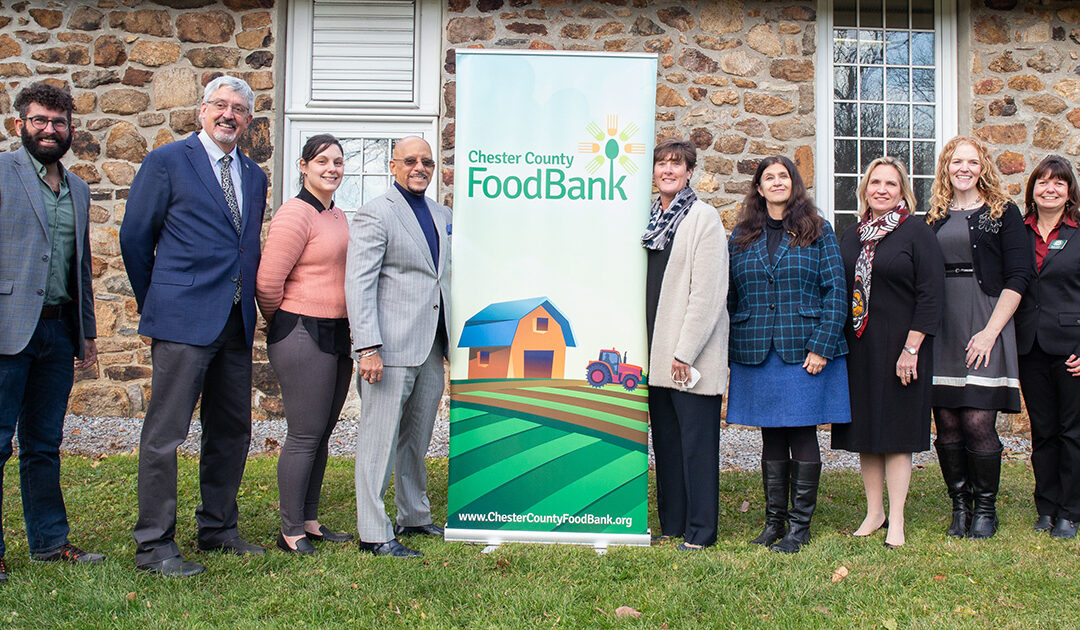Reading, PA – December 9, 2021 − First Lady Frances Wolf joined members of the General Assembly and representatives from the charitable food network today at Mary’s Shelter in Reading to announce an $11.4 million investment in cold storage infrastructure for food banks serving every county of Pennsylvania.
“It is critical that we turn the lessons learned throughout the pandemic into meaningful action that will make a difference in the lives of people in Pennsylvania,” said First Lady Wolf. “This investment will result in a better, stronger, more resilient food system, which translates to a better, stronger, more resilient commonwealth.”
The COVID-19 Food Bank Cold Storage Infrastructure Program, funded by the American Rescue Plan, is a grant program that will allow Pennsylvania’s food banks to purchase, expand, or upgrade cold storage facilities to ensure that they can deliver fresh food to struggling families. Eligible purchases include refrigerators, coolers, freezers, refrigerator trailers and cargo vans, building expansions, and more. This program will touch all 67 counties and is essential to addressing food insecurity and food waste.
The program will fund the following food banks across the commonwealth, through an award of $11,392,345 to Feeding Pennsylvania:
- Alliance for Nonprofit Resources – $276,000, serving Butler County
- Bucks County Opportunity Council – $55,025, serving Bucks County
- Central PA Food Bank – $2,585,000, serving Adams, Bedford, Blair, Bradford, Centre, Clearfield, Clinton, Columbia, Cumberland, Dauphin, Franklin, Fulton, Huntingdon, Juniata, Lancaster, Lebanon, Lycoming, Mifflin, Montour, Northumberland, Perry, Potter, Snyder, Sullivan, Tioga, and Union counties
- Chester County Food Bank — $621,005, serving Chester County
- Community Food Warehouse of Mercer County – $137,000, serving Mercer County
- Fayette County Community Action Agency – $130,000, serving Fayette County
- Food for Families – Cambria – $279,000, serving Cambria County
- Food Helpers – Washington – $346,000, serving Washington County
- Greater Pittsburgh Community Food Bank – $1,241,740, serving Allegheny, Armstrong, Beaver, Greene, Lawrence, and Somerset counties
- Helping Harvest – Berks/Schuylkill – $1,077,000, serving Berks and Schuylkill counties
- Indiana County Community Action Program – $265,000, serving Indiana County
- Philabundance – $156,000, serving Bucks, Chester, Delaware, Montgomery, and Philadelphia counties
- Share Food Program – $2,604,000, serving Bucks, Chester, Delaware, Montgomery, and Philadelphia counties
- SHFB of Lehigh Valley and NEPA – $60,900, serving Carbon, Lehigh, Monroe, Northampton, Pike, and Wayne counties
- SHFB of Northwest PA – $748,675, serving Cameron, Clarion, Clearfield, Crawford, Elk, Erie, Forest, Jefferson, Mckean, Venango, and Warren counties
- Weinberg NEPA Regional Food Bank – $580,000, serving Lackawanna, Luzerne, Susquehanna, and Wyoming counties
- Westmoreland County Food Bank – $80,000, serving Westmoreland County
- York County Food Bank – $150,000, serving York County
“It’s become very clear over the past year or so that food insecurity is a major problem not just in the commonwealth, but across the nation. The investments the Wolf Administration is making in food banks will bolster our ability to get food into the hands of people who need it the most,” said Senator Judy Schwank. “Additionally, offering a great diversity of nutritious, fresh food products thanks to refrigeration units will greatly benefit the health of Pennsylvanians.”
Governor Tom Wolf has worked to simultaneously support the charitable food system and agriculture industry throughout his administration by continuously investing in programs that connect surplus agricultural foods with families in need and funding projects to decrease food waste. Gov. Wolf first funded the Pennsylvania Agricultural Surplus System Program in 2015 and has since invested more than $20 million to support farmers and families facing food insecurity.
In 2019, the Food Recovery Infrastructure Grant Program was created to address cold storage needs for food banks and reduce waste of fresh food. When COVID-19 came to Pennsylvania in 2020, Gov. Wolf expanded the program and increased funding from $4 million to $9.6 million ensure food needs were met. This Cold Storage Infrastructure Program will work further meet the breadth of needs identified during the review process for the Food Recovery Infrastructure Program.
“Feeding more Pennsylvania families requires increasing capacity for transportation, refrigeration and measures to ensure that food is safe,” said Agriculture Secretary Russell Redding. “These investments help Pennsylvania agriculture continue to grow, feed our economy and strengthen the charitable food system across the commonwealth.”
“The charitable food network is beyond grateful for this investment in our food banks and our partner agencies like Mary’s Shelter to increase our capacity to store and transport fresh and frozen food,” said Feeding Pennsylvania Chief Executive Officer Jane Clements in Reading today. “We are grateful to the Wolf Administration and Democratic Leadership for recognizing this critical need that will support so many food insecure Pennsylvanians.”
The Cold Storage Infrastructure Grant Program was championed by the House and Senate Democrats.
“Since the pandemic, local food cupboards and pantries have shared with me the increase in demand for food and services,” Rep Christine Sappey, D-Chester, said. “The Chester County Food Bank serves as a pivotal connection in the distribution of donated goods to local partner organizations throughout the county, so it’s important that they have the ability to ensure safe, healthy nutrition reaches families that need it. This funding will help the Food Bank accomplish that.”
“Over the course of this pandemic, we saw lines of cars for miles of people waiting for food assistance from our local food banks. It was a stark visual reminder of just how many of our neighbors live with food insecurity or are just one missed paycheck away from it,” Rep. Emily Kinkead, D-Allegheny, said. “I am proud to see the Governor recognizing the essential role food banks played in getting us through this pandemic and that he has made a commitment to ensure that they receive the necessary investments to continue and to expand their vital work in our communities.”
“For many of our neighbors, not knowing when their next meal will be or where it is coming from is a daily struggle,” Rep. Manuel Guzman, D-Berks, said. “As food insecurity continues to affect more and more of our most vulnerable citizens, it is vital to take a proactive approach in combatting this epidemic through initiatives such as ensuring our local food banks are properly equipped and funded. I am proud to see these resources be earmarked for such a worthwhile cause and look forward to exploring avenues to expand funding to all area food banks.”
“Food banks play a vital role in helping those in our community put food on the table,” Rep. Kristine Howard, D-Chester, said. “By bolstering cold food storage, food banks can focus on providing quality, healthy food to those who need it rather than worrying about if their donations are going to spoil.”
“On the heels of the pandemic, I’m thrilled that Gov. Wolf’s administration is making this much needed investment to help strengthen food banks across the Commonwealth. As well, Pennsylvania’s minimum wage falls woefully short of what individuals need to make ends meet,” said Sen. Tim Kearney. “Having a strong foundation for our food banks will help ensure no individual or family will have to choose between putting food on the table or paying for other critical bills like rent or prescription medication.”
“I’m thrilled to see ARP funds being used to fund cold storage infrastructure for our food banks. Getting these dollars into the communities that have been hardest hit by not just the pandemic, but also by factors such as the loss of reliable public transportation, the lack of healthy options available in neighborhoods, and economic downturns that began long before 2020 has been an enormous priority for me and the entire Senate Democratic Caucus,” said Sen. Lindsey Williams. “We need to spend this money in ways that give us the best return on our investment, and the Cold Storage Infrastructure Program is a perfect example of how to do this.”
For more on the Wolf Administration’s efforts to improve food security throughout the commonwealth, visit agriculture.pa.gov/foodsecurity.

